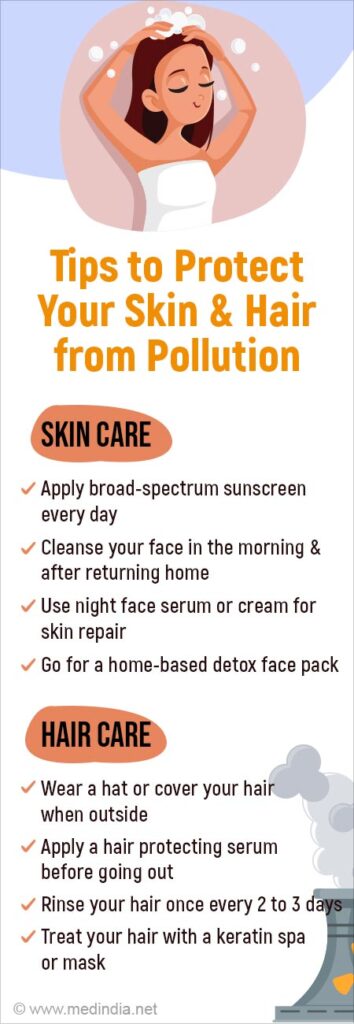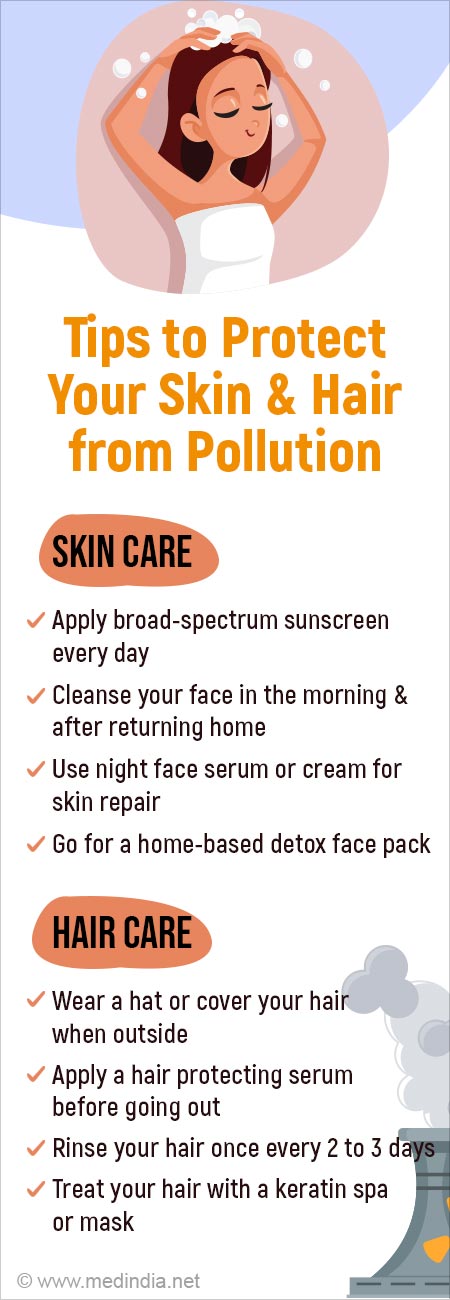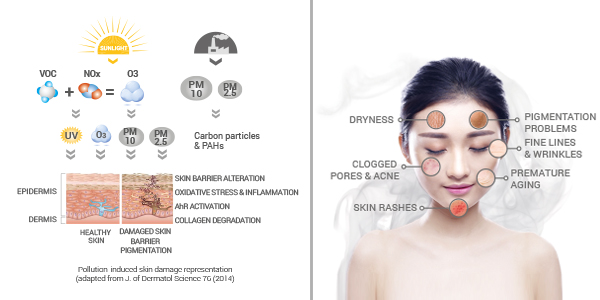Fort Walton Beach, FL
428 Mary Esther Cut Off NW Unit A,
Fort Walton Beach, FL
32548, United States
(850) 374-3595
Discover effective measures to shield your skin from pollution and keep it healthy and radiant. Learn about the damaging effects of pollution, types of pollutants, and the role of antioxidants. Find skincare products, create a skincare routine, and adopt healthy lifestyle habits for optimal skin protection.

Are you concerned about the effects of pollution on your skin? In today’s world, pollution is everywhere and can have a detrimental effect on our skin. But don’t worry, there are steps you can take to protect your skin from the harmful effects of pollution. Whether it’s investing in skincare products that contain antioxidants, practicing a consistent skincare routine, or even seeking professional advice from experts like Tilly Souriyseng of The Beauty Experts, there are plenty of ways you can safeguard your skin and keep it healthy and radiant. Discover effective measures to shield your skin from pollution and ensure that it stays at its best.

This image is property of www.medindia.net.
Pollution is not just harmful to the environment; it also has detrimental effects on our skin. The pollutants present in the air can damage the skin’s barrier function and lead to various skin problems. The skin acts as a protective barrier against external aggressors, but prolonged exposure to pollutants can weaken this barrier, making it more susceptible to damage.
Pollutants such as fine particulate matter, gases, and heavy metals can penetrate the skin and cause inflammation, oxidative stress, and DNA damage. This can result in a dull complexion, uneven skin tone, dryness, and irritation. Additionally, pollution can also trigger skin conditions like acne, eczema, and rosacea.
Common pollutants that have a significant impact on the skin include:
One of the most concerning effects of pollution on the skin is its contribution to premature aging. Exposure to pollutants can accelerate the breakdown of collagen and elastin, which are essential for maintaining the skin’s firmness and elasticity. This leads to the development of fine lines, wrinkles, and sagging skin. Pollution also increases the production of free radicals, which promote skin aging and damage cellular DNA.
Long-term exposure to polluted environments can have serious consequences for the skin. Studies have shown that individuals living in highly polluted areas experience higher rates of skin disorders, such as dermatitis and eczema. Prolonged exposure to pollutants can also worsen existing skin conditions and delay their healing process. Moreover, research suggests that pollution can interfere with the skin’s natural repair mechanisms, hindering its ability to recover from damage and maintain its overall health.
To protect your skin from the harmful effects of pollution, it is essential to incorporate effective skincare practices into your everyday routine.
Thoroughly cleansing your skin is crucial in removing the build-up of pollutants and impurities. Use a gentle cleanser twice a day to wash away dirt, excess oil, and any residue left by pollutants. Look for cleansers with ingredients like activated charcoal or moringa extract, which have detoxifying properties.
Antioxidants play a vital role in protecting the skin from pollution-induced damage. They neutralize free radicals and reduce oxidative stress, preventing premature aging and maintaining the skin’s health. Look for skincare products that contain antioxidants like vitamin C, vitamin E, green tea extract, and resveratrol.
Using skincare products specifically formulated to combat pollution can provide an extra layer of protection for your skin. Look for ingredients like niacinamide, which strengthens the skin’s barrier function, and peptides, which help boost collagen production. Pollution-fighting products often contain ingredients that create a shield against pollutants, such as cityguard, an innovative substance that forms a physical barrier on the skin.
After cleansing and moisturizing, consider applying a protective barrier on your skin to further shield it from pollution. This can be in the form of a face cream or lotion that creates a thin film on the skin’s surface. Look for products with occlusive ingredients like ceramides and hyaluronic acid to seal in moisture and prevent the penetration of pollutants.
When it comes to protecting your skin from pollution, there are specific skincare products that can be particularly beneficial.
Anti-pollution cleansers are designed to remove pollutants effectively while maintaining the skin’s balance. These cleansers often contain ingredients like glycolic acid or salicylic acid to gently exfoliate the skin and unclog pores. Look for cleansers that offer a deep cleansing action without stripping the skin of its natural oils.
As mentioned earlier, antioxidants are essential in combating pollution-induced damage. incorporating serums and moisturizers that are rich in antioxidants will help protect your skin from free radicals and oxidative stress. Look for products that have a high concentration of antioxidants like vitamin C and resveratrol for maximum effectiveness.
While pollution can harm the skin, it is also important not to forget the damaging effects of the sun’s UV rays. Sunscreen is a crucial step in any skincare routine, especially when it comes to protecting against pollution. Choose a broad-spectrum sunscreen with at least SPF 30 and apply it generously to all exposed areas of your skin, including the face, neck, and hands.
Face masks specifically formulated to combat pollution can provide an extra boost of protection. Look for masks that contain ingredients like activated charcoal, antioxidants, or plant extracts known for their detoxifying properties. These masks can help draw out impurities, nourish the skin, and create a barrier against pollutants.
In addition to a proper skincare routine, nourishing your skin from the inside out can help strengthen its barrier function and protect against pollution.
Include plenty of antioxidant-rich foods in your diet to support your skin’s health. Foods such as berries, leafy green vegetables, citrus fruits, and nuts are packed with antioxidants that can neutralize free radicals and reduce inflammation. A diet rich in antioxidants can help your skin defend itself against pollution-induced damage.
Staying hydrated is essential for maintaining healthy skin. Water helps flush out toxins and aids in the natural detoxification process of the body. Aim to drink at least eight glasses of water a day to keep your skin hydrated and healthy.
Certain foods can trigger inflammation and exacerbate skin conditions. Limit your intake of processed foods, sugary snacks, and high-fat foods. Instead, opt for a balanced diet that includes whole foods, lean proteins, and omega-3 fatty acids, which have anti-inflammatory properties.
Incorporating supplements into your routine can provide additional support for your skin’s health. Consider taking supplements like vitamin C, vitamin E, and omega-3 fatty acids, as they have been shown to benefit the skin and protect it from environmental damage. However, always consult with a healthcare professional before starting any new supplements.

This image is property of www.nutraingredients-asia.com.
A strong and healthy skin barrier is crucial in protecting your skin from pollution and maintaining its overall health.
Opt for a gentle pH-balanced cleanser that won’t disrupt the skin’s natural barrier. Harsh cleansers with high pH levels can strip the skin of its natural oils, leaving it vulnerable to pollution. Look for cleansers labeled as pH-balanced or those specifically formulated for sensitive skin.
Keeping your skin moisturized is essential for maintaining its hydration levels and preventing moisture loss. Choose a moisturizer that suits your skin type and contains hydrating ingredients like hyaluronic acid or ceramides. Apply moisturizer twice a day, in the morning and evening, to keep your skin nourished and protected.
While exfoliation can be beneficial for removing dead skin cells and promoting cell turnover, over-exfoliation can damage the skin’s barrier function. Limit exfoliation to once or twice a week, and opt for gentle exfoliants that won’t cause irritation or inflammation.
Extreme weather conditions, such as cold temperatures and low humidity, can further aggravate the skin’s barrier function. Protect your skin by wearing appropriate clothing, using a humidifier indoors to add moisture to the air, and applying a moisturizer with occlusive ingredients to lock in hydration.
In addition to a skincare routine, adopting healthy lifestyle habits can contribute to overall skin protection.
While it may not always be possible to completely avoid polluted environments, take measures to minimize your exposure. Avoid heavy traffic areas, use public transportation when possible, and limit outdoor activities during peak pollution times, such as rush hour.
Smoking not only harms your overall health but also has a profound negative impact on your skin. The toxins in cigarette smoke can accelerate the aging process, cause wrinkles, and contribute to a dull complexion. Quitting smoking is one of the best things you can do for your skin’s health and overall well-being.
Chronic stress can wreak havoc on your skin, leading to inflammation and worsening of skin conditions. Find healthy ways to manage stress, such as practicing yoga, meditation, or engaging in hobbies that help you relax. Taking care of your mental well-being can reflect positively on your skin.
Sleep is crucial for the skin’s healing and regeneration processes. Aim for 7-8 hours of quality sleep each night to allow your skin to repair itself from daily damage. Lack of sleep can lead to increased inflammation, dark circles, and a dull complexion.

This image is property of femina.wwmindia.com.
In highly polluted environments, using physical barriers can provide an extra layer of protection for your skin.
A wide-brimmed hat or cap can shield your face and neck from pollutants in the air, as well as provide protection against harmful UV rays. Opt for a hat with a broad brim that covers your face and neck area effectively.
Pollution can also affect the delicate skin around the eyes. Wear sunglasses with UV protection to shield your eyes and the surrounding skin from both pollution and the sun’s harmful rays.
When spending time outdoors in polluted areas, cover your skin with suitable clothing. Choose lightweight, breathable fabrics that cover your arms and legs to minimize direct exposure to pollutants. This can also provide an added level of protection against UV radiation.
In addition to physical barriers like hats and clothing, don’t forget to apply a physical sunscreen to exposed areas of your skin. Physical sunscreens, also known as mineral sunscreens, contain ingredients like zinc oxide or titanium dioxide that create a physical barrier on the skin, reflecting UV rays away from the skin’s surface.
Regular facial treatments can help detoxify the skin and remove impurities caused by pollution.
professional facials performed by trained estheticians can provide a deep cleanse to remove pollutants and impurities from the skin. These facials often include exfoliation, steaming, extraction of blackheads or whiteheads, and the application of specialized masks to detoxify the skin.
Chemical peels are a type of facial treatment that uses chemical solutions to exfoliate the skin and remove dead skin cells. They can help remove impurities caused by pollution, promote cell turnover, and improve the overall texture and tone of the skin. It is important to consult with a professional before undergoing a chemical peel to determine the most suitable option for your skin type.
Microdermabrasion is a non-invasive procedure that uses a diamond-tipped wand to exfoliate the outermost layer of the skin. It effectively removes dead skin cells, stimulates collagen production, and promotes a smoother and rejuvenated complexion. Regular microdermabrasion treatments can help remove pollutants and keep the skin looking fresh and revitalized.
Infrared saunas use infrared light to deeply penetrate the skin and increase perspiration, promoting detoxification. The heat from the sauna can help flush out toxins, unclog pores, and improve blood circulation, resulting in a clearer and healthier complexion. Consult with a professional to ensure safe and suitable usage of infrared saunas.

This image is property of static-bebeautiful-in.unileverservices.com.
Maintaining balanced humidity levels in your environment can significantly impact your skin’s health and its ability to combat pollution-induced damage.
Using a humidifier can help add moisture to dry indoor environments, especially during winter when central heating can cause low humidity levels. Optimal humidity levels range between 40-60%. Adequate humidity can help keep your skin hydrated and prevent it from becoming dry and more susceptible to pollution.
While it is essential to add moisture to dry environments, it is equally important to avoid excessively dry or humid environments. Extremely low or high humidity levels can disrupt the skin’s natural balance and exacerbate skin conditions. Strike a balance by monitoring humidity levels and adjusting accordingly.
Maintaining a balanced humidity level at home can be achieved through various methods. In addition to using a humidifier, you can also ensure proper ventilation to avoid stagnant indoor air. Keeping plants indoors can also help increase humidity levels naturally.
Opt for hydrating skincare products that help replenish moisture and maintain hydration levels. Look for ingredients like hyaluronic acid, glycerin, and ceramides, as they have excellent hydrating properties. Applying a hydrating mask once or twice a week can also provide an extra boost of moisture.
Your skin’s needs can change over time, and it is important to regularly assess and adapt your skincare routine to suit your skin’s specific requirements.
Pay attention to any changes or reactions your skin may exhibit. Keep an eye out for signs of inflammation, dryness, excessive oiliness, or new breakouts. If you notice any persistent issues, consider consulting a dermatologist for a professional evaluation.
A dermatologist can provide valuable insights into your skin’s condition and recommend specific products or treatments tailored to your needs. Professional advice is especially important if you have pre-existing skin conditions or are experiencing persistent skin problems.
Environmental conditions can vary throughout the year, and your skin’s needs may change accordingly. For example, during colder months, you may need to use richer moisturizers and lip balms to combat dryness. In warmer months, lighter formulations and oil-free products may be more suitable. Pay attention to environmental factors and adjust your skincare routine accordingly.
Consistency is key when it comes to maintaining healthy skin and protecting it from pollution. Stick to your skincare routine diligently, ensuring that you cleanse, moisturize, and protect your skin every day. Consistency will allow your skin to adapt and benefit from the products and practices you incorporate.
In conclusion, understanding the effects of pollution on the skin is essential for developing a comprehensive skincare routine aimed at protection and preservation. By cleansing thoroughly, using antioxidants, choosing pollution-fighting products, applying protective barriers, and adopting healthy habits, you can minimize the damaging effects of pollution. Regular assessments, facial treatments, balanced humidity, and adapting your routine as needed will ensure that your skin remains healthy, resilient, and prepared to face the challenges of a polluted environment. Prioritize the health of your skin, and it will thank you with a glowing complexion.